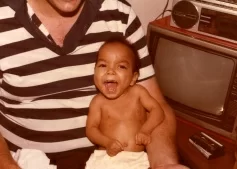 without a thought on my part. But Luke came to my mind yesterday and I looked up some information on him and discovered that his birthday had just passed. I found this old article that I wrote about Luke a few years ago. I thought I'd share it again. I am convinced that there are important and significant lessons we can learn from his life, and that I need to regularly share what I think they are. I hope you enjoy this!
without a thought on my part. But Luke came to my mind yesterday and I looked up some information on him and discovered that his birthday had just passed. I found this old article that I wrote about Luke a few years ago. I thought I'd share it again. I am convinced that there are important and significant lessons we can learn from his life, and that I need to regularly share what I think they are. I hope you enjoy this!The mysteries of God are a part of the Christian life that can often lead to confusion, doubt and even discouragement for believers.
- For some, it's a pride thing. We want to have answers – we want to understand, to be able to grasp the complexities of Biblical truth and God's plan for mankind.
- For some, God's mysteries – the unexplained things of life – are stumbling blocks to faith:
1. Why do bad things happen to good people?
2. Why does He allow pain, suffering and evil to thrive in our world?
Several months ago we were witnesses to the aftermath of the tragedy in Pennsylvania involving the Amish community, where, good, decent, hard working, non violent people were subjected to unspeakable cruelty towards their children. How can this happen?
3. One of our CSC children, who grew up in the worst poverty imaginable in Cebu City, was adopted into a family in the United States several years ago. Well meaning people would tell her how lucky she was and how God obviously had a wonderful plan for her life. She had a hard time with that and would sometimes ask her parents, "But what about all the kids who are still there, who weren't adopted, and who are still suffering and dying? What is God's wonderful plan for their lives? Why me and not them?
For many of us, we celebrate the goodness of God in our lives, we praise him for his healing, for material comforts, for blessing our efforts – even as we observe people who remain sick or disabled, who suffer in poverty – those who efforts and initiatives end in disappointment and ruin.
There are two extremes in terms of people's reactions to the things about God and life that are not understood.
1. There are those who try in vain to grasp the ungraspable – to be able to reduce the mysteries to understandable formulas or explanations. I remember a young seminarian who came to Cebu and who filled the pulpit of our church on a Sunday evening. He preached for an hour on the "peace of God that passes all understanding." Perhaps he felt that if he preached long enough he could crack that nut and open our understanding!
We all know those who have reduced the book of Revelation to precise charts and timetables, giving us easy to understand categories for all of human history and, most especially, the times to come.
2. A second category are those who shake their heads and say, "We'll only know these answers when we get to heaven." They suspend inquiry, not bothering to seek answers to the perplexing questions of life.
Living and working in a Third World country like the Philippines brings some of these mysteries to the front of our lives. Poverty, and all that goes with it, is "in your face." People often ask me "How do you like living in the Philippines?" That's a tough one to answer. Life anywhere has its highs and lows. Some days are great, others are difficult. I often answer this way:
1. When I'm sitting down to a nice breakfast I am aware that, within a few meters of my house are families that have no breakfast.
2. When I'm driving to the office or the Shelter I often pass people walking along the road who, for lack of a few cents can not even afford public transportation and must walk.
3. When I stop to buy medicine for my family or the CSC kids, there are people standing nearby whose children are dying for lack of that very same medicine.
Why am I blessed and they are not?
I recall a conversation with a missionary a few days after Cebu was hit by a strong typhoon. Many of our CSC workers lost their roofs or their entire homes. The houses of the poor were devastated by the high winds and torrential rains. The missionary said that it had been such a miracle how God spared the missionary homes from damage, holding his hands of protection around us during the storm. I remember wondering whether it wasn't more a matter of our having cement houses and strong metal roofs.
Why did our CSC kids have to suffer so much? And how much more, those who live on the street and cannot be admitted to CSC?
These are tough questions. When it comes to trying to understand our own suffering, the Bible gives some answers. For example, Romans 5:3-4 tells us that suffering produces perseverance, perseverance character, and character, hope. And the Bible gives us additional hope that we will someday come to see God's purpose and mysteries:
"But now we see through a glass dimly, but then face to face."
And we hear the testimonies of Christian brothers and sisters who have lived through terrible times and have turned negatives into positives in their lives.
Several months ago I was attending a conference in Bismark, North Dakota. One of the featured speakers was Steve Saint, Steve's father, Nate Saint, was one of the five missionaries killed in 1956 by Aucan warriors in Equador. Steve told about what that tragic day meant to his family, and what it was like when his dad, his hero, didn't come home that day. We saw video of his current family life, and saw a man who was interacting with Steve's children, and who was being referred to as "Uncle." It turns out that this was the very man who had killed Steve's father, who had come to know Jesus and had experienced the forgiveness of God and of the Saint family and now was a part of their family – an amazing story of how good things had come out of tragedy and suffering.
So the clear message is that God has a plan for our lives, we will discover that plan in the right time. He is writing our life's stories, but some of the chapters are difficult ones.
We can understand this. We can, when aided by the Holy Spirit, see how difficulties and suffering are part of a purification process for us, and that we, like Job, will eventually be better people for it.
But what about people who, because of major disabilities, are unable to understand their situation, unable to discern the hand of God or his plan for their lives. Where is the purification and growth and ultimate value for these people? What could God's purpose possibly be?
Back on 1982 a baby was born in a charity ward in a small hospital in Cebu City. 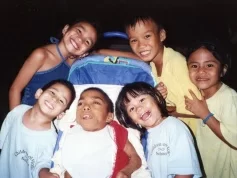 The baby underwent cardiac arrest during birth and was without oxygen for an extended time. Unlike many cases of charity patients, the hospital staff decided to resuscitate the baby, even after he had suffered massive brain damage and cerebral palsy. The baby's mother abandoned him in the hospital, and after a couple months Luke was referred to CSC. When we took him in he appeared to be a bouncing baby boy. We did not know that he would not develop physically beyond about a year and a half, or mentally beyond a few months. Luke would never speak, nor have voluntary movement of his arms or legs.
The baby underwent cardiac arrest during birth and was without oxygen for an extended time. Unlike many cases of charity patients, the hospital staff decided to resuscitate the baby, even after he had suffered massive brain damage and cerebral palsy. The baby's mother abandoned him in the hospital, and after a couple months Luke was referred to CSC. When we took him in he appeared to be a bouncing baby boy. We did not know that he would not develop physically beyond about a year and a half, or mentally beyond a few months. Luke would never speak, nor have voluntary movement of his arms or legs.
Luke became a fixture at CSC. For over 23 years he was an integral part of our lives and a symbol of CSC and what we are all about.
Many times Luke would be hospitalized – often due to upper respiratory infections. He fought for his life many times. There were at least a dozen times when we were sure that he would die. The doctors had told us that he wouldn't make it past five years old. Then they revised it to nine, then 11 – certainly he wouldn't reach his teenage years.
One time, when Luke was critically ill our staff met to pray and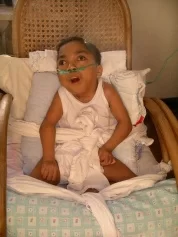 I asked them to reflect on his life. Here is why: I believe that God had a purpose for Luke's life when he created him. I believe that He uses people like Luke to teach us important things. But here is the rub: If we don't spend time reflecting on these lessons, then Luke's life is useless. Its up to us to allow God to make sense of Luke's life.
I asked them to reflect on his life. Here is why: I believe that God had a purpose for Luke's life when he created him. I believe that He uses people like Luke to teach us important things. But here is the rub: If we don't spend time reflecting on these lessons, then Luke's life is useless. Its up to us to allow God to make sense of Luke's life.
And what are the lessons that we found? What has God taught us through his life?
1. First, life is precious. Even though he had nothing to live for, from the world's point of view, Luke clung to live almost ferociously. Some of us who have much more to live for take life casually, we take life for granted. Not Luke. Every day was a struggle. Every breath had to be fought for. Life is a gift from God and we should treat it carefully.
2. God has provided us with opportunities, through Luke's life, to minister to him in significant and life-saving ways. He has provided an avenue for us to live out the biblical mandate to minister unto the "least of these," because, truly, Luke was in that category. Hundreds of people have been given a blessing to participate in the support of CSC that reaches out to children like Luke and many others with other special needs.
3. In so doing, He has given us a chance to show others a Godly value system that doesn't reserve love and attention for those who have something to give back, or who have "potential" or a bright future. For many people who live in a developing country, where resources are limited, this has been a difficult lesson to learn. How could we justify spending so much money for Luke's hospitalization when other, "normal" kids needed care? Luke's life gave us the opportunity to teach about the value of life and about how God looks at all of us.
4. Luke has been a tremendous ambassador for CSC. People around the world remember observing the loving care that he received by our staff and workers. They remember his famous smiles. They may quickly forget the names of the staff or other children, but they remember Luke. "How's Luke doing?" we get asked wherever we go to talk about the ministry of CSC. And our care of Luke helps us explain the true nature and core values of our work in the Philippines.
5. Luke has been a safety valve for those that had an opportunity to know him. My job as Field Director of CSC involves lots of administrative chores, like making budgets, government relations and various kinds of problem solving. There are days when I get stressed out and start to feel the weight of the world on my shoulders. But all I needed to do is to drive a few short miles to where Luke lived, to hold him in my arms, and I get a clear picture of what real struggles are all about. My struggles paled in comparison to what Luke faced every day. Self pity may be easy for some people, but those that knew Luke have no excuse for feeling sorry for themselves. What a great gift that was to all of us.
A little over a week before we left Cebu, Marlys called me on my cell phone and told me that I should get to the hospital quickly, as Luke wasn't doing well. He had been hospitalized for over a week and his breathing was bad. I had gotten messages similar to this one throughout Luke's life, so I went to the office and took care of a few things. But the Lord laid it on my heart to go see Luke and when I entered his room his breathing was extremely labored. He looked different than I had ever seen him, and it became clear that he was dying. I sat down next to him, kissed him and looked into his eyes. For 23 years we had loved this boy. It wasn't easy to say goodbye. I said to him, "Luke. You can go. Go to be with Jesus, Luke. I love you." Within a couple of minutes Luke took his last breath. 23 years of pain, suffering, limitations, hospitalizations, forced breathing, skin rashes and infections were over. We would never see Luke's smile again.
As Luke was dying in that hospital room, I made a promise. I'm not sure if I was making a promise to Luke, to God or to myself. But I decided then and there that I was going to talk about Luke on our coming furlough. I believed then and do now, that the church of Jesus Christ needs to hear about Luke, that the lessons of his life are important ones. Many Americans are complainers - full of self pity. People who have so many material comforts are unsatisfied. American discourse is increasingly a chorus of victim and entitlement claims. Charles Sykes, in his book "A Nation of Victims: The Decay of the American Character" states that, "in a nation where everyone is a victim, no one is a victim." In our preoccupation with our own needs we have a hard time seeing the needs of others – people like Luke.
In his song "God Help the Outcasts," the Hunchback of Notre Dame poses several difficult issues:
I don't know if there's a reason
Why some are blessed, some not
Why the few You seem to favor
They fear us, flee us,
Try not to see us.
The first part we have already examined. The second is our call to arms. "Why the few You seem to favor, they fear us, flee us, try not to see us."
I don't know what factors might make it difficult for us to see the needs of society's outcasts. Perhaps we are too busy. Maybe our personal and church calendars are so full that there just isn't room for Luke, or the man who had fallen to thieves at the side of the road, to break into our day. Maybe we are numbed or fatigued by the needs of others, or simply overwhelmed by the circumstances of our own lives. Maybe we have become cynical. "Why did that guy travel this road at this time carrying that amount of money? He deserves what he got!"
Maybe, just maybe, Luke can help cut through the apathy, the self-centeredness and cynicism of our lives. He was a person with significant needs that he didn't cause. He was totally dependent on others to live. His life had none of the possibilities and opportunities that we take for granted every day. He needed us so very much. Maybe Luke can serve as a symbol of many others that we come into contact with. Maybe Luke can help us rescue our lives.
Lockdown Victories
Space is something we Filipinos don't care too much about. To name a few examples: our houses our built right next to each other; there is minimal to non-existent personal space; shoppers are literally rubbing elbows at the biggest public market in the city; and passengers are squished inside a small jeepney.
But space is something our founders thought an important factor when building a child-caring center. During this pandemic time, where children are prohibited to go out of their homes, our children are still able to "go out" of their homes. They are still able to enjoy a game of soccer and kickball in our huge playground. Our toddlers are still able to ride their scooters on our driveways. Our children are still able to run around and chase each other in a game of tag. The space we have makes the lockdown endurable for everyone.
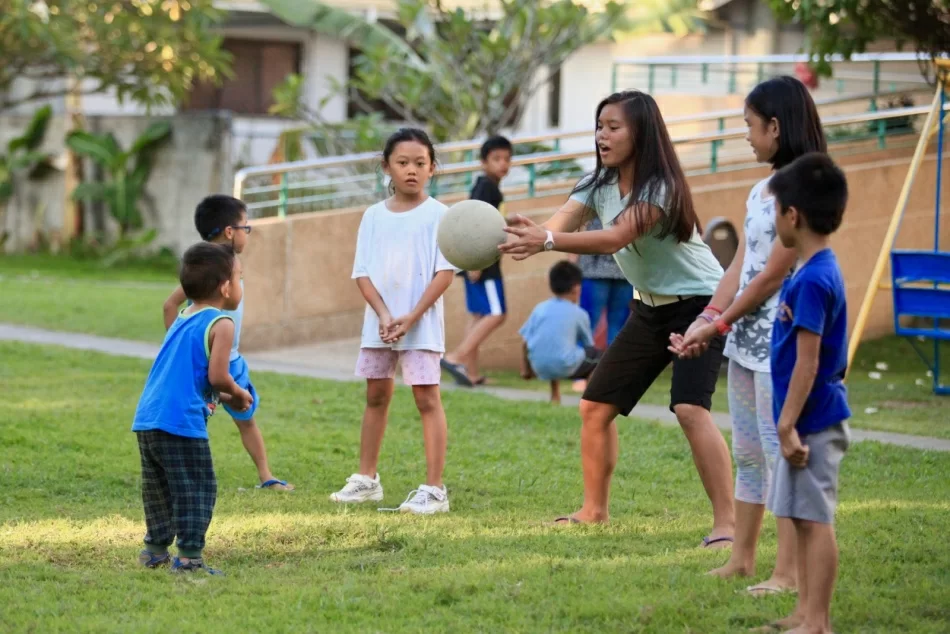
Employing 100+ Filipino workers is an evidence of CSC's commitment to the children it serves. This means we have people who can do the job for our children. This means our children can be children again and not worry about adult responsibilities.
But this lockdown gave our children the opportunity to step up. Older children looking after the younger ones, children cooking dessert and meals for the home, children leading praise and worship nights, older children taking on their responsibilities whole-heartedly. We are proud of the small and big victories are children are achieving.
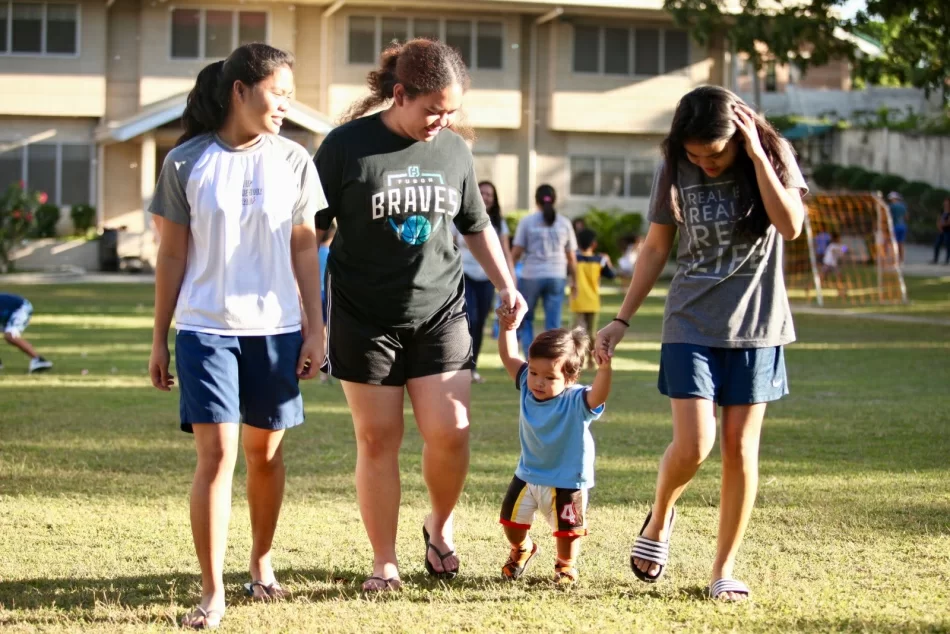
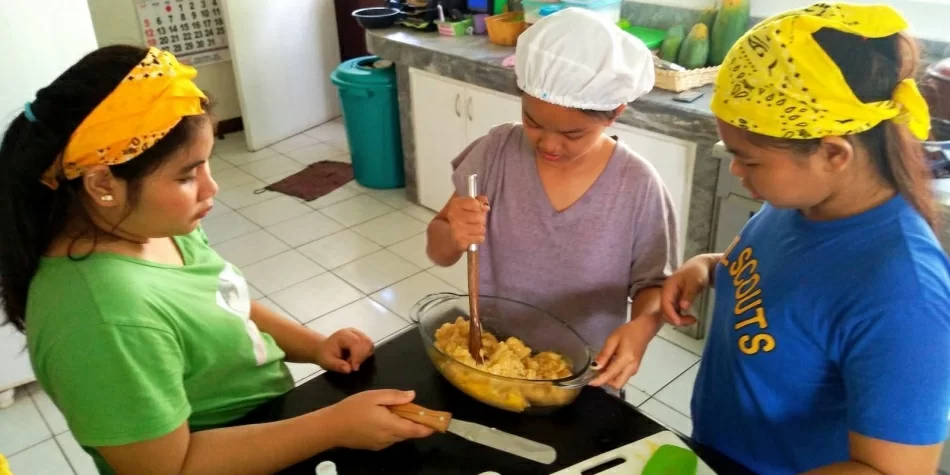
Our houseparents live on-site. We require that of them so our children will have that constant adult figure in their lives. They have various tasks and responsibilities in the homes. Just like any other parent, they too have different parenting styles. Being in lockdown gave the chance for our houseparents to talk more, share notes, and give each other encouraging words. The houseparents supporting each other leads to better parenting in our homes. Happy parents equal to happy children.
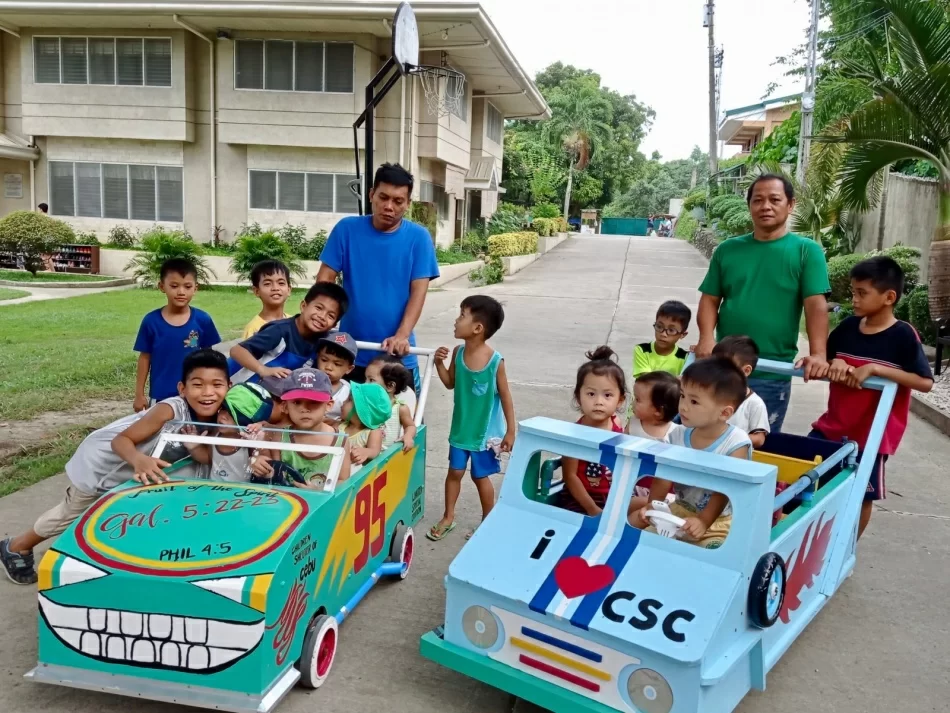
This pandemic is discouraging at times, but we choose to celebrate the small and big wins during this time.
Connection During COVID-19
In May 2019, after 40 years, we the Social Work team, were able to move our case files and office to the building inside the compound of the residential shelter, where we were able to join the rest of the multi-disciplinary team, which has always held office at the shelter. Moving the office brought us hope of improving services by being closer to the children and the rest of the multi-disciplinary team.
When COVID-19 caused CSC to call for employees to be locked-in, two of our three Social Workers (Mardy and Glaiza) were able to volunteer to stay inside. Mardy and Glaiza saw this as an opportunity to continue strengthening relationships with the children, work more closely with the multi-disciplinary team, and dig into some pending files. Cris, the remaining Social Worker, worked from home.
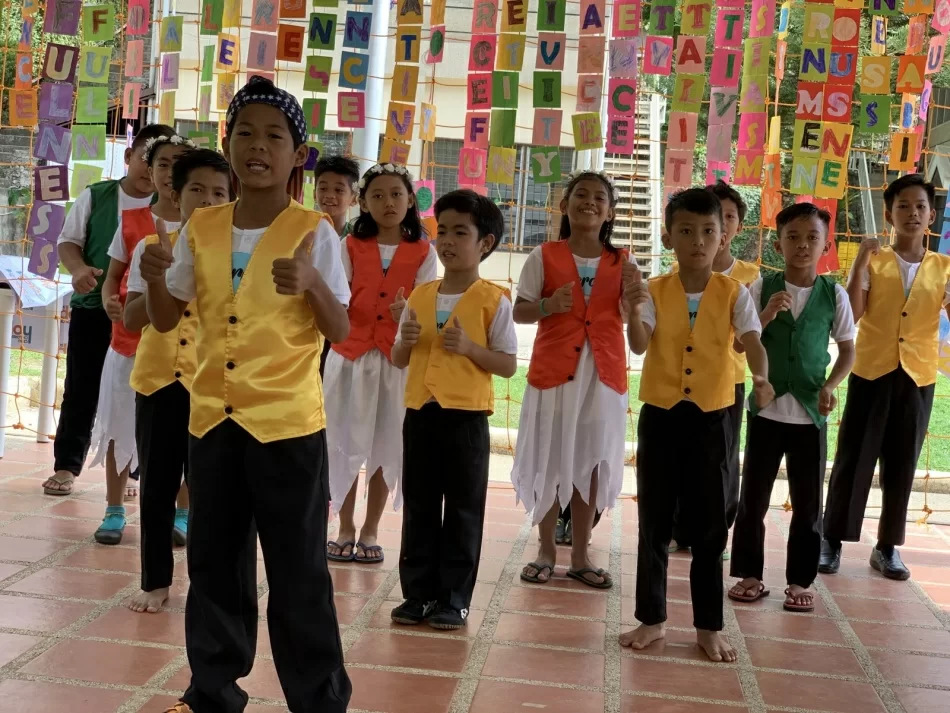 This pandemic posed challenges in case management. We knew it was important to keep the children involved. During the annual Summer Activity Program given to the children at CSC, we were given time to have a "Short Talk" or focused group discussion on an overview of challenges in case management. This was conducted recently at the Medical Building. It was attended by 32 children, ages 10 and above. It was facilitated by Mardy and Glaiza.
This pandemic posed challenges in case management. We knew it was important to keep the children involved. During the annual Summer Activity Program given to the children at CSC, we were given time to have a "Short Talk" or focused group discussion on an overview of challenges in case management. This was conducted recently at the Medical Building. It was attended by 32 children, ages 10 and above. It was facilitated by Mardy and Glaiza.
During the Short Talk, the kids were observed to be engaged, listening, and interested in the topic as they discussed how the challenges brought about by the pandemic affected their future. The children learned that physical birth family visits were not possible with government-imposed travel restrictions and health safety protocols of CSC, but that connecting with birth family as approved, was to be done through telecommunication.
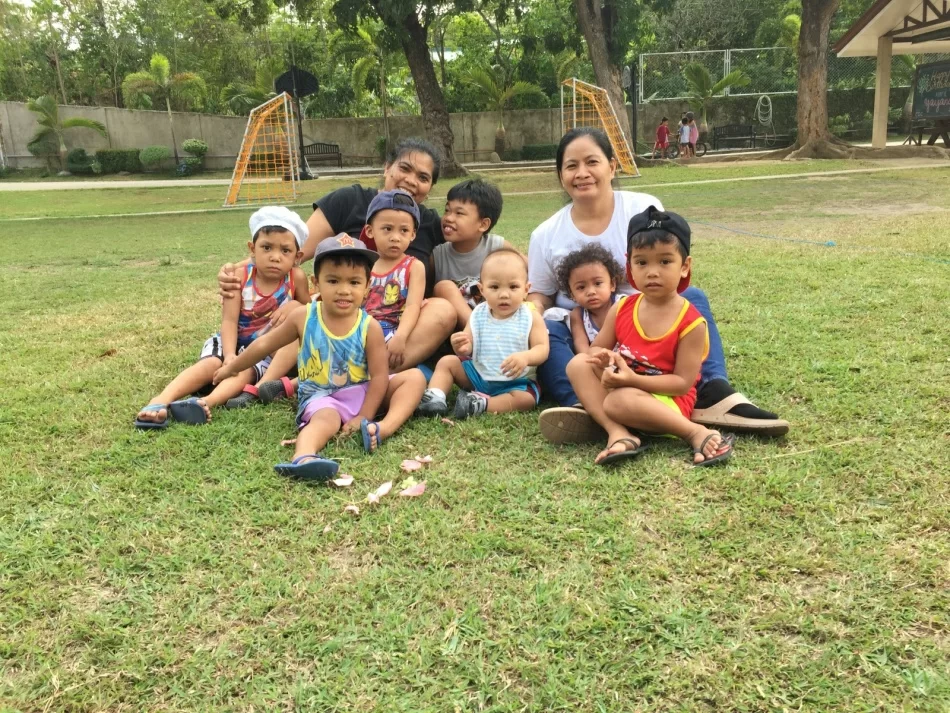 It was a time to affirm that the we and multi-disciplinary team were doing our best to continue to provide for the holistic needs of the children by adapting and learning new ways to deliver services. This could be seen by Cris calling houseparents and children on the phone, counselors providing telecounseling, and therapy services adapted to be home-based until therapists could be admitted inside the shelter after quarantine. Other staff, such as the nurses and teachers, were also locked-in to ensure that the service was available to the children. The children were encouraged as the social workers shared that they (along with the multi-disciplinary team) were always looking at the individual needs of the child and advocating for their best interests.
It was a time to affirm that the we and multi-disciplinary team were doing our best to continue to provide for the holistic needs of the children by adapting and learning new ways to deliver services. This could be seen by Cris calling houseparents and children on the phone, counselors providing telecounseling, and therapy services adapted to be home-based until therapists could be admitted inside the shelter after quarantine. Other staff, such as the nurses and teachers, were also locked-in to ensure that the service was available to the children. The children were encouraged as the social workers shared that they (along with the multi-disciplinary team) were always looking at the individual needs of the child and advocating for their best interests.
The children understood the challenges we faced to complete some requirements due to travel restrictions or safety protocols and that this affected other professionals and offices working on their cases as well. However, the children were assured that we were proactive in lobbying for them. Social workers were in contact with government offices, including the Department of Social Welfare and Development and Inter-Country Adoption Board. We were learning new ways to submit Child Study Reports and to keep connected with other professionals and agencies involved in case management. True to being advocates, it is at the heart of the social work department to steward time and services available for the benefit of the child regardless of the circumstance.
The rising concern among the older children at risk of aging out of adoption was discussed. They expressed concern about what their future would hold and if that would be together with CSC. It was explained that CSC had prepared for this by teaching the children at the shelter life and independent living skills. The Independent Living Program was still a residential shelter but with more in-depth training on these skills to help them transition out to the community.
We can imagine the inner turmoil social workers and case workers, nationally and around the globe, have at this time being unable to physically reach their clients or offices. Our heart goes out to the children and families who have lost this connection and keep them in our prayers.
Thankfully, at CSC, we have the option to be together with the children. We have options that allow us to continue in our ministry commitment to provide children a temporary shelter and case management. Being with them has allowed us to further think out of the box and see areas we can continue to serve.
This pandemic has highlighted challenges and blessings in connection. As social workers in service to the children at CSC, the time to be with them has been an encouragement to us. We are blessed to see how the children are growing, coping, and learning during this season. We are grateful for this opportunity to be able to connect and be readily available to them.
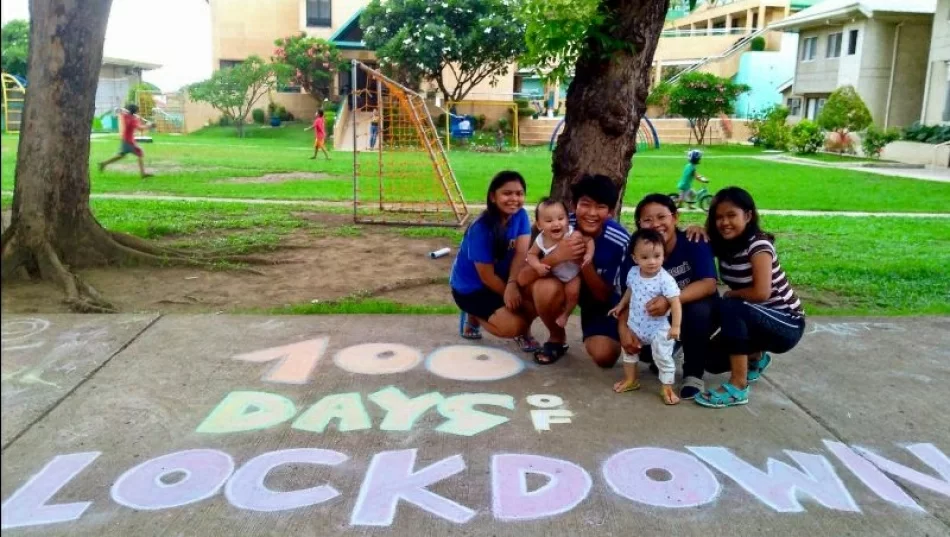
The Biggest Concern
This week, Heather and I had a Skype meeting with two missionaries from Menomonie, WI. We had never met before, so we took the time get to know one another, talk about our respective ministries, and pray for each other. Before praying, they asked me, "what are some of your needs that we can be praying for at this time?"
It's not an uncommon question, and it certainly wasn't unexpected, but it's been rattling around in my heart ever since.
There are a lot of visible needs at the Shelter during this pandemic. There's the need for health and safety. The need for hand sanitizer and personal protective equipment. There's the need for food, clean water, school curriculum, clothing, and medicine. For those of us going around town, there's the need for documentation and preparation to ensure safe passage through checkpoints. By the grace of God, through the generosity of our supporters, all these things have been provided. The children can play games, enjoy full meals, and receive all the love, support, and care that we can muster.
Then there are those needs that aren't as visible. There's the need for strength and calm; for endurance, patience, diligence, and faithfulness. There's the need for friendships and encouragement. There's the need for prayer and time spent with the One who ultimately provides for all our needs. Thank you for praying with us. I can tell you firsthand that they are being felt as we navigate this pandemic together.
There is a need I fear may go unnoticed, forgotten, or neglected by the world at large ...
But the one need that's been rattling around in my heart is one that I fear may go unnoticed, forgotten, or neglected by the world at large. This pandemic has strained governments and the systems that we have in place to help the vulnerable; to help the widow and the orphan—to help the least of these (Matt 25:40). Since the start of this pandemic, we have not had any children placed with adoptive families, and only a handful of our children have been presented for regional, national, or international matching (that is to say, the processes that governments use to match children with prospective adoptive families, both locally and internationally, has been severely hindered due to the coronavirus pandemic). What makes this reality even more difficult to face is the fact that quite a few of our children will be aging out of adoption in the coming months; meaning, they will reach an age where adoption is no longer allowed.
This is a video of an extremely long line that formed in Guadalupe, Cebu City when the local government announced it would be disbursing aid to impoverished families during the quarantine. The Department of Social Welfare and Development (DSWD), which we work with for referrals and placements, is also tasked with handing out this aid.
We knew this day could potentially come for our older children, and we've been doing our best to prepare all our kids for whatever life has in store for them, including independent adult life in the Philippines. We will prayerfully continue to do so, hoping to launch our older children into a healthy and beautiful adulthood.
But I would like to ask all of you to please take some extra time to pray. Pray for these kids who will be aging out in the coming months. Pray that they will be able to cope emotionally, and pray that all of us at CSC are able to provide them with the love and support that they need to be launched into a beautiful future without an adoptive family.
And pray for a miracle. Some of our kids have less than a few months before aging out. Pray that domestic and international government agencies will be able to process the needed paperwork, and that the right families will be searching at just the right time. Thank you for praying with us.
Pandemic Lessons
I had breakfast with a CSC donor today. He and his wife have been very generous to CSC over the years. He had previously owned a business in the Twin Cities and he mentioned how glad he was the he didn't have to be trying to run a business during this pandemic. I think we all have things in our past that we are glad we don't have to deal with during this challenging and difficult time. Although I miss being on the Leadership teams in Cebu so much, I don't really miss some of the difficult discussions and hard decisions that need to be made almost on a daily basis. The thing that makes them hard is that they affect lives, and we don't have a grand blueprint for success in navigating this pandemic. None of us has ever seen anything like this so we have no data base of proven methods to bank on .
I am so glad that our new Field Director, Roberto Atienza, is so talented and enthusiastic to embrace the challenges of leading CSC in Cebu during this time. I'm sure he would rather be leading under different circumstances but he has stepped up and taken on the challenges with vigor and tireless effort. His term of leadership began when the pandemic was already upon the Philippines. While still learning some of the basics about the ministry, getting to know our leaders and deciding on a management style he was suddenly leading meetings about quarantines, supply chains, manpower crises, lockdowns, mobility limitations, and the financial, social work, educational, medical, HR and spiritual issues that this crisis presents to CSC. And these have been oom meetings, not face to face sessions where it is easier to share feelings and interpret ideas and reactions. I am thankful that he is not wishing he was someplace else or focusing on the negative parts of ministry in a pandemic. His faith in God is strong, contagious and encouraging to the people whose pictures are on the Zoom screen and who rely on him for direction, support and spiritual leadership.
Am I glad that I am not having to lead CSC at this time? Well, that is a complicated question. We left Cebu in part because of concerns because of our age and health issues, and we don't second guess that. I miss the interactions with our great Leadership Team, watching them rise to the occasion every single day. I miss consultations with Roberto on a wide range of issues and watching the child care workers and other lock-in staff doing an exceptional job. But I don't miss some of the pressure packed meetings that are necessary, of having to come up with fresh ideas when I don't feel like I have any more, and facing the sobering realities every day of a deadly disease lurking just outside our CSC campus that it is our job to keep out. I know that at 66 years of age I don't have the same stamina I used to have.
I am glad that God worked out a transition of leadership in Cebu and that Roberto is clearly His man for the job. Stepping aside and letting him lead was a seamless transition for me because of who he is as a man of God and a leader. I know that Stateside is where we are supposed to be, even if we miss the kids and workers so much it hurts sometimes. In that respect I'm glad to be where I am.
Please keep Roberto and the Leadership Team in your prayers during these tough days. I can say from experience that they feel your prayers, your love and encouragement and need it very much. Thanks!
Leaving
A few months ago we were planning our trip back to Minnesota 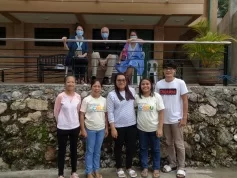 to start our retirement. Because of the pandemic our flights were canceled and we were put on "enhanced community quarantine." Basically , we have had to stay inour home for the past 100 days, unable to go to the shelter or the office or the Children of Hope School to see the kids and workers. Needless to say it has been a challenging time for everyone at CSC. During our extended quarantine we have been checking to see if there are any flights out of the Philippines, preferably Cebu. We were happy to be here, helping out Roberto and the Leadership team in helping assure that our children are receiving the best care possible during the
to start our retirement. Because of the pandemic our flights were canceled and we were put on "enhanced community quarantine." Basically , we have had to stay inour home for the past 100 days, unable to go to the shelter or the office or the Children of Hope School to see the kids and workers. Needless to say it has been a challenging time for everyone at CSC. During our extended quarantine we have been checking to see if there are any flights out of the Philippines, preferably Cebu. We were happy to be here, helping out Roberto and the Leadership team in helping assure that our children are receiving the best care possible during the 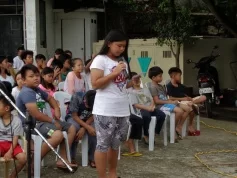 lockdown in Banawa. We have attended regular Zoom meetings, discussing manpower and financial issues, keeping our US office appraised of the situation here and dealing with logistical issues of moving people and goods around during times of strict measures that limit mobility.
lockdown in Banawa. We have attended regular Zoom meetings, discussing manpower and financial issues, keeping our US office appraised of the situation here and dealing with logistical issues of moving people and goods around during times of strict measures that limit mobility.
Just the other day we heard of a flight to the U.S. via Korean Airlines and Delta. In order to make this flight we needed to secure a Travel Pass to get to the airport, health certificates andbarangay and immigration clearances. Jill from our US office 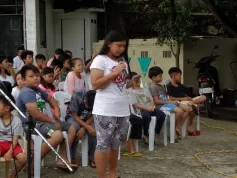 helped a lot as did our Administrative Assistant, Vanjing and Jerry Salgo, the person who has coordinated all the security and transportation matters for CSC thr0ughout this crisis.
helped a lot as did our Administrative Assistant, Vanjing and Jerry Salgo, the person who has coordinated all the security and transportation matters for CSC thr0ughout this crisis.
So we are leaving Cebu on July 4! Its Wait and Hurry Up. We are trying to organize our possessions, the accumulation of 41 years of living in Cebu, in just a few days. Some things were are selling, some we are shipping to MN and most we are giving away. But arranging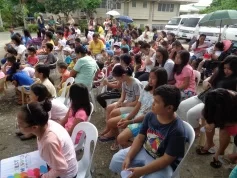 all of our emotions has been more challenging. The thoughts of walking away from the ministry that has been our life for 41 years had been on the back burner for a long time as we weren't sure how the pandemic was going to play out. We had been emotionally prepared to be here in Cebu until Christmas if necessary.
all of our emotions has been more challenging. The thoughts of walking away from the ministry that has been our life for 41 years had been on the back burner for a long time as we weren't sure how the pandemic was going to play out. We had been emotionally prepared to be here in Cebu until Christmas if necessary.
So now we are scurrying to get ready to leave. So many CSC and other people are helping us. One of the nicest gifts to us 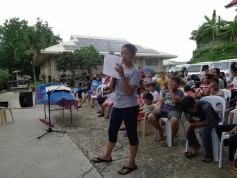 was an amazing farewell party at the Shelter this morning. Although we weren't able to actually hug or be near the children or workers, we did go inside the CSC compound. We sat on the area outside the conference room of the Gleddie Building and heard the kids sing, give tributes and give us a ton of love and appreciation. It was the first time we had seen them in more than 100 days. Lots of tears were shed. It wasn't the party we had imagined months ago when we were preparing for retirement, but it was a wonderful party and we are so thankful to the Leadership Group for planning it. We were humbled. It made leaving Cebu, although still difficult, seem somehow more manageable because we were able to see and hear the kids we love so much.
was an amazing farewell party at the Shelter this morning. Although we weren't able to actually hug or be near the children or workers, we did go inside the CSC compound. We sat on the area outside the conference room of the Gleddie Building and heard the kids sing, give tributes and give us a ton of love and appreciation. It was the first time we had seen them in more than 100 days. Lots of tears were shed. It wasn't the party we had imagined months ago when we were preparing for retirement, but it was a wonderful party and we are so thankful to the Leadership Group for planning it. We were humbled. It made leaving Cebu, although still difficult, seem somehow more manageable because we were able to see and hear the kids we love so much.






